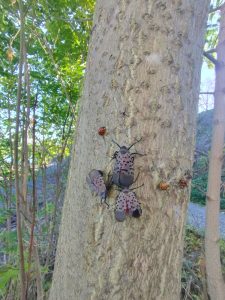By: Jesse Lloyd, Lead Owasco Lake Watershed Inspector
Winters in the Finger Lakes Region have long been characterized by cold temperatures, heavy snowfalls, and ice-covered lakes. However, in the past 20 years, the region has experienced a significant shift in winter climate patterns. Warmer temperatures, precipitation variability, and an increase in extreme weather events have reshaped the region’s winters. These shifts are part of a broader pattern of climate change that is having wide-ranging effects on the environment, economy, and lifestyles of residents in the Finger Lakes Region.
Warmer Winters and Reduced Snowfall
Over the last two decades, average annual temperatures in the Finger Lakes Region have risen, with winters becoming increasingly mild. While the area still observes relatively cold winter seasons, as experienced early this year, the overall trend has been one of warming. According to the National Oceanic and Atmospheric Administration, the Northeast United States warmed more than any other region over the last five decades. Rhode Island is warming faster than any of the other lower 48 states and has already passed the United Nations planning threshold, having increased two degrees Celsius since pre-industrialization levels. Several other states in the Northeast follow close behind. These state-by-state differences in warming highlight the critical need for regional-scale climate modeling. Global temperature averages don’t necessarily reflect average temperatures locally, because the impacts of climate change are unevenly distributed (www.usgs.gov)1. Scientists are investigating the reason for this accelerated warming pattern in Rhode Island and the greater Northeast. A common hypothesis is that warming waters in the Atlantic Ocean are contributing to especially rapid warming patterns in the coastal and inland areas of the Northeast.
The warming trend locally has led to a reduction in the number of days with below-freezing temperatures, and a shorter duration of the winter season (www.weather.gov)2. One of the most noticeable effects of warmer winters has been a reduction in snowpack. While the Finger Lakes Region still sees significant snow, particularly in areas near Lake Ontario, the amount of snow has decreased in some parts of the region. Warmer temperatures result in more rain during the winter months, rather than snow. This variability in precipitation patterns has led to more unpredictable winter weather, with periods of heavy snow followed by milder, rain-soaked days. For example, winter storms that used to bring consistent snow accumulation are now often followed by a thaw, making it difficult for communities to rely on typical winter weather forecasts.
The reduction in snow accumulation has significant implications for winter recreation and tourism. Ski resorts in the region, such as Song Mountain and Greek Peak, rely on consistent snowfall for their operations. Warmer winters have forced these businesses to invest in snowmaking technology to ensure that there is enough snow to maintain slopes. This added expense, combined with unpredictable snow seasons, has posed challenges for the winter sports industry.
From 2012 to 2018, Greek Peak Ski Lodge located in Virgil New York, experienced a yearly average of 35.5 snow days and a snow fall total of 93.5 inches. From 2019 to 2024, they experienced a yearly average of 18.2 snow days and snow fall total of 58.8 inches (www.onthesnow.com)3. This dramatic change in snowfall has resulted in increased snow making costs for the lodge, as well as the need to close trails. Accordingly, Greek Peak has greatly enhanced their snow making capabilities to encourage continued patronage by winter recreators. Leveraging a $384,000 incentive from National Grid, Greek Peak purchased 57 high-efficiency snow guns to cover 55 trails and 220 skiable acres. The resort also added 12 high-efficiency hydrants, electric air compressors, and upgraded pumps for snowmaking. The new system reduces energy usage, saves money, and is environmentally friendly, according to National Grid. (www.cnybj.com)4.
Shifts in Ice Cover and Water Temperature
The conspicuous decline of ice cover on the Finger Lakes is also associated with warming patterns. Some of the region’s lakes, including Owasco, Skaneateles, and Otisco are known for ‘freezing over’ during the coldest months of the year. However, the current warming trend has led to a reduction in the number of years when these lakes freeze completely. In some years, ice cover is significantly thinner, and in others, the lakes don’t freeze much at all.
The lack of consistent ice cover is concerning for a number of reasons. For one, it disrupts traditional activities such as ice fishing and snowmobiling, which have been part of the local culture for generations. Additionally, the ice plays an important role in regulating the temperature of the water below, maintaining a stable environment for aquatic species. Without sufficient ice cover, water temperatures in the lakes remain higher during the winter months, potentially affecting fish habitats and aquatic ecosystems.
Increased winter temperatures also have an impact on the timing of spring thaw. In years past, the region’s lakes would thaw gradually, allowing for a slow transition to warmer weather. However, the shift to warmer winters means that the thaw now occurs earlier and more rapidly, which can be detrimental for both local wildlife and the region’s economy. For instance, earlier thaws can lead to higher levels of runoff, resulting in increased erosion along the lakeshores and a greater influx of sediment and nutrients into the lakes.
Despite the challenges faced with an evolving climate, the Finger Lakes Region has a long history of adaptability and resilience. Residents can work together to protect the environment, economy, and way of life, by embracing innovative and lake-friendly solutions and continuing to monitor and respond to winter weather dynamics.
Sources
Source1-Northeast Warming Faster than the Rest of the U.S. | U.S. Geological Survey
Source2–www.weather.gov/wrh/Climate?wfo=bgm (Auburn, NY weather station)
Source3 – www.onthesnow.com/new-york/greek-peak/historical-snowfall
Source4 – www.cnybj.com/greek-peak-works-with-national-grid-on-snowmaking-upgrades/

